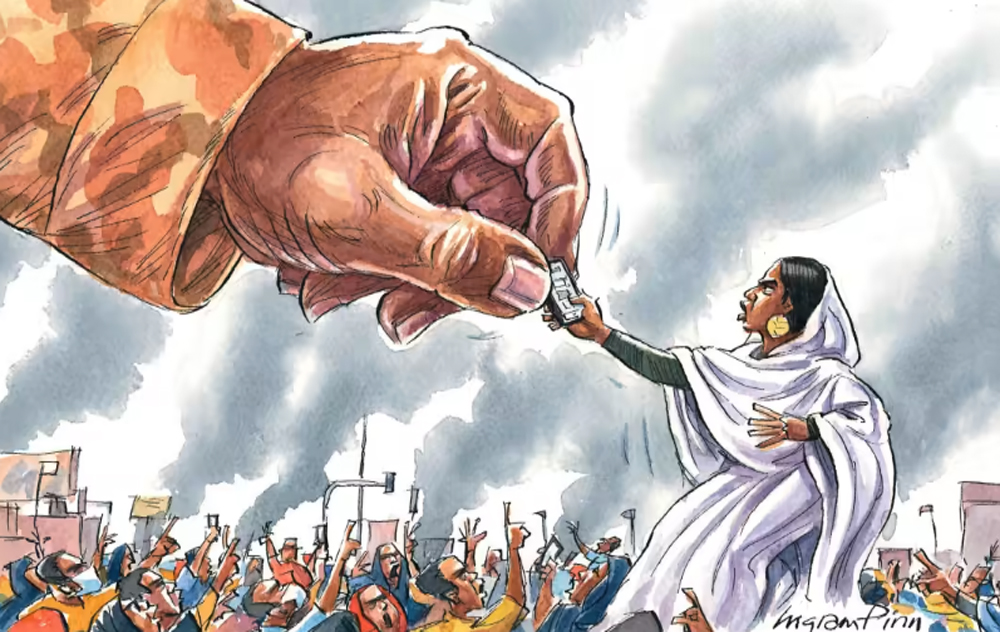
Digital Democracy
Translated by moatinoon
Source: Herdo Center for Digital Expression Support
In the pre-Internet era, individuals have become accustomed to speaking on policy issues, public affairs and human rights in public, family or with colleagues. With a boom in the Internet, information and communication technology, especially social networks from (Facebook-Tutor...), news and interactive websites, blogs and other digital technology paradigms have allowed individuals and groups to have vast spaces and free space to deliberate and discuss in all matters of life and at their disposal the political judiciary, thereby giving the ruling Gobleton and the minorities of political leaders.
Not only does the phenomenon of digital democracy stop at societal, political, economic and ideological, but it extends to the technological, hence it is a phenomenon in which community and policy scientists are looking at and involved in the world of digital storage revolution, specialized in information and communication networks, and specialized in technology and technology development.
The term digital, attached to technology, comes from the way in which any data or information is stored on computers in a digital format, which allows for the storage of vast amounts of information, as well as rapid transmission. This tremendous development has coincided with various tools specializing in the generation and circulation of digital information on a broad scale, at cheap prices and, with great ease, with the existence of overwhelming global trends that insist on the need to disseminate democracy, human rights and the adoption of their mechanisms in the field of opinion and participation.
The evolution of the digital democracy phenomenon has met with the global development of the Movement for Democracy and Human Rights. The digital environment has succeeded in providing an integrated democratic infrastructure, through an integrated system capable of deliberating information on democratic practice.
The use of information and digital communication technology tools in the generation, collection, compilation, analysis and circulation of all information, data and knowledge related to the practice of the values of democracy and their different mechanisms, regardless of the perception of democracy and its intellectual objectives, its effectiveness and integrity in its position.
So digital democracy is not a kind of democracy, but its just a new way of exercising democracy, and thats why digital technology plays an important role in changing democratic practices and making things happen that have never existed before.
That is, digital democracy employs technology tools, either for the purpose of renewing the content of democratic practice, expanding the scope and functioning of democracy, or even reshaping the rules of the democratic game, but it does not create another kind of democracy.
Decline in parties role, digitization of politics
In the context of the growth of the role that has been played and the means of communicating socially and voluntary organizations in attracting the concerns of individuals and groups and in expressing their views in private and public affairs without restrictions political parties are no longer the only institutions that express political orientation, The interests of individuals and of different groups in society are presented by technological development and the exploratory public view of political, social and cultural issues as an alternative to parties usual political discourse.
Digital reality has become an important tool in detecting the hidden from information, the volume of corruption, a tool for lobbying leaders and governments in political reconciliation societies and a means of exposing them, as well as exposing the poor quality of products and services provided by corporations and institutions, which will be a great tool of capital capital, and will be a document of development.
From here, the conflict arose between attempts to conceal and conceal corruption and the search for transparency, and the area of this conflict has become the virtual reality, not the newspapers or the visible media.
Digital democracy has become more representative and reflective of the views of individuals and groups in partisan, parliamentary, presidential and semi-presidential terms, the role of political parties in mobilizing and expressing social and political interests has been reversed and transformed into digital parties.
Policy digitization is a phenomenon that will evolve rapidly, produce forms of digitization of political representation and societies that will reflect the interests of individuals and communities, and will reflect digitization on human life patterns, political culture, political pressures and political actors. In Egypt, the attitude of the Egyptian parties has made clear the dead of politics and the domination of politics, becoming fragile, weak and unable to fulfil the policy functions entrusted to them in bringing together the economic and social interests of a segment or certain social sectors and the political expression of their peaceful policy.
Given the history of the parties, the marginal role of political parties in political mobility, which was easily restored with the formation of the Kafa movement, can be noted, then 6 April, after which the All We Are Happy movement was formed on the hypothetical reality. Before 25 January, political parties could play a prominent role in the preparations for Egypts revolutionary uprising and shared with one another a revival and a weak border in the revolutionary process, The revolution and subsequent political developments are indicative of the decline in Egyptian party life. the emergence of digital democracy and the trend of new generations of young people into cyberspace to express opinion and exert political pressure on power in Egypt.
All of this reflects the emergence of a new virtual political system in which new information plays a similar role to that of intermediate institutions. The Internet has strengthened communication between decision-making and public opinion, and has made it possible for a large number of new democratic practices to emerge.
It will also be pleased with the process of increasing awareness of political information and freedoms, enhancing transparency in the process of decision-making and increasing awareness of human rights globally, so that international justice and justice receive attention from State institutions and pressure on the systems legitimacy.

